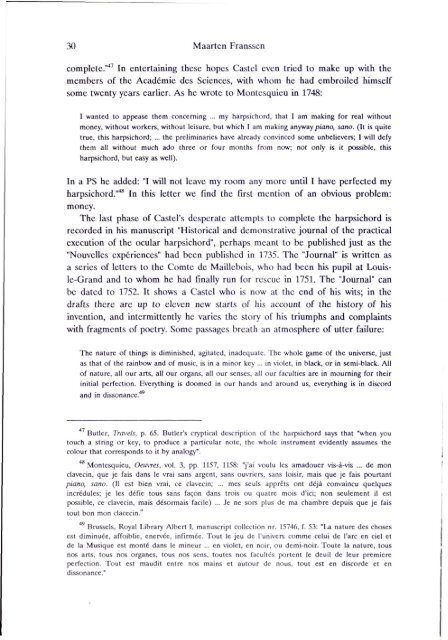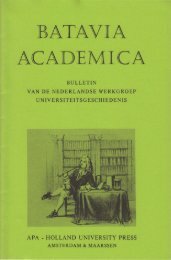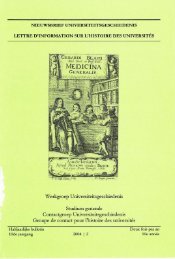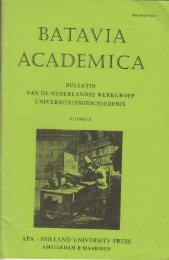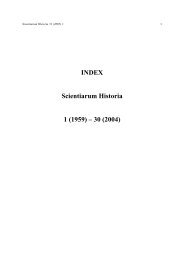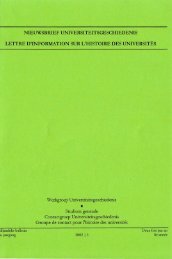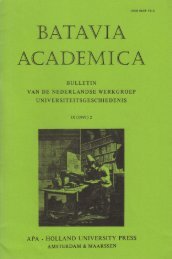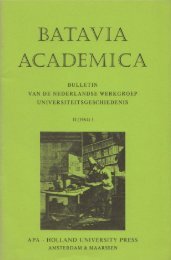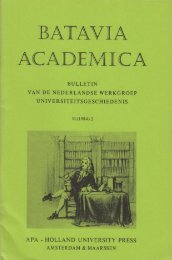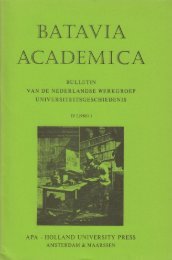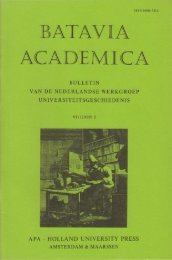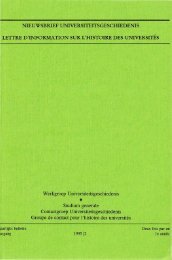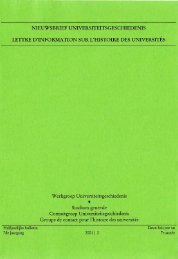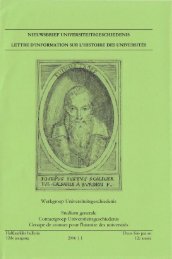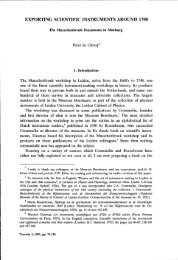the ocular harpsichord of louis-bertrand castel - Gewina
the ocular harpsichord of louis-bertrand castel - Gewina
the ocular harpsichord of louis-bertrand castel - Gewina
Create successful ePaper yourself
Turn your PDF publications into a flip-book with our unique Google optimized e-Paper software.
30 Maarten Franssen<br />
complete."''^ In entertaining <strong>the</strong>se hopes Castel even tried to make up with <strong>the</strong><br />
members <strong>of</strong> <strong>the</strong> Academic des Sciences, with whom he had embroiled himself<br />
some twenty years earlier. As he wrote to Montesquieu in 1748:<br />
I wanted to appease <strong>the</strong>m concerning ... my <strong>harpsichord</strong>, that I am making for real without<br />
money, without workers, without leisure, but which I am making anyway piano, sano. (It is quite<br />
true, this <strong>harpsichord</strong>; ... <strong>the</strong> preliminaries have already convinced some unbelievers; I will defy<br />
<strong>the</strong>m all without much ado three or four months from now; not only is it possible, this<br />
<strong>harpsichord</strong>, but easy as well).<br />
In a PS he added: "I will not leave my room any more until I have perfected my<br />
<strong>harpsichord</strong>."^* In this letter we find <strong>the</strong> first mention <strong>of</strong> an obvious problem:<br />
money.<br />
The last phase <strong>of</strong> Castel's desperate attempts to complete <strong>the</strong> <strong>harpsichord</strong> is<br />
recorded in his manuscript "Historical and demonstrative journal <strong>of</strong> <strong>the</strong> practical<br />
execution <strong>of</strong> <strong>the</strong> <strong>ocular</strong> <strong>harpsichord</strong>", perhaps meant to be published just as <strong>the</strong><br />
"Nouvelles experiences" had been published in 1735. The "Journal" is written as<br />
a series <strong>of</strong> letters to <strong>the</strong> Comte de Maillebois, who had been his pupil at Louisle-Grand<br />
and to whom he had finally run for rescue in 1751. The "Journal" can<br />
be dated to 1752. It shows a Castel who is now at <strong>the</strong> end <strong>of</strong> his wits; in <strong>the</strong><br />
drafts <strong>the</strong>re are up to eleven new starts <strong>of</strong> his account <strong>of</strong> <strong>the</strong> history <strong>of</strong> his<br />
invention, and intermittently he varies <strong>the</strong> story <strong>of</strong> his triumphs and complaints<br />
with fragments <strong>of</strong> poetry. Some passages breath an atmosphere <strong>of</strong> utter failure:<br />
The nature <strong>of</strong> things is diminished, agitated, inadequate. The whole game <strong>of</strong> <strong>the</strong> universe, just<br />
as that <strong>of</strong> <strong>the</strong> rainbow and <strong>of</strong> music, is in a minor key ... in violet, in black, or in semi-black. All<br />
<strong>of</strong> nature, all our arts, all our organs, all our senses, all our faculties are in mourning for <strong>the</strong>ir<br />
initial perfection. Everything is dcximed in our hands and around us, everything is in discord<br />
and in di.ssonance.'"<br />
Butler, Trawls, p. 65. Butler's cryptical description <strong>of</strong> <strong>the</strong> <strong>harpsichord</strong> says that "when you<br />
touch a string or key, to produce a particular note, <strong>the</strong> whole instrument evidently assumes <strong>the</strong><br />
colour that corresponds to it by analog)".<br />
Montesquieu, Oeuvres, vol. 3, pp. 1157, 1158: "j'ai voulu les amadouer vis-a-vis ... de mon<br />
clavecin, que je fais dans le vrai sans argent, sans ouvriers, sans loisir, mais que je fais pourtant<br />
piano, sano. (II est bien vrai, ce clavecin; ... mes seuls apprcts ont deja convaincu quelques<br />
incredules; je les defie tous sans fa^on dans trois ou quatre mois d'ici; non seulement il est<br />
possible, ce clavecin, mais desormais facile) ... Je ne sors plus de ma chambre depuis que je fais<br />
tout bon mon clacecin."<br />
Brussels, Royal Library Albert I, manuscript collection nr. 15746, f. 53: "La nature des choses<br />
est diminuee, affoiblie, enervee, infirmee. Tout le jeu de I'univers comme celui de Tare en ciel et<br />
de la Musique est mont^ dans le mineur ... en violet, en noir, ou demi-noir. Toute la nature, tous<br />
nos arts, tous nos organes, tous nos sens, toutes nos facultcs portent le deuil de leur premiere<br />
perfection. Tout est maudit entre nos mains et autour de nous, tout est en discorde et en<br />
dissonance,"


